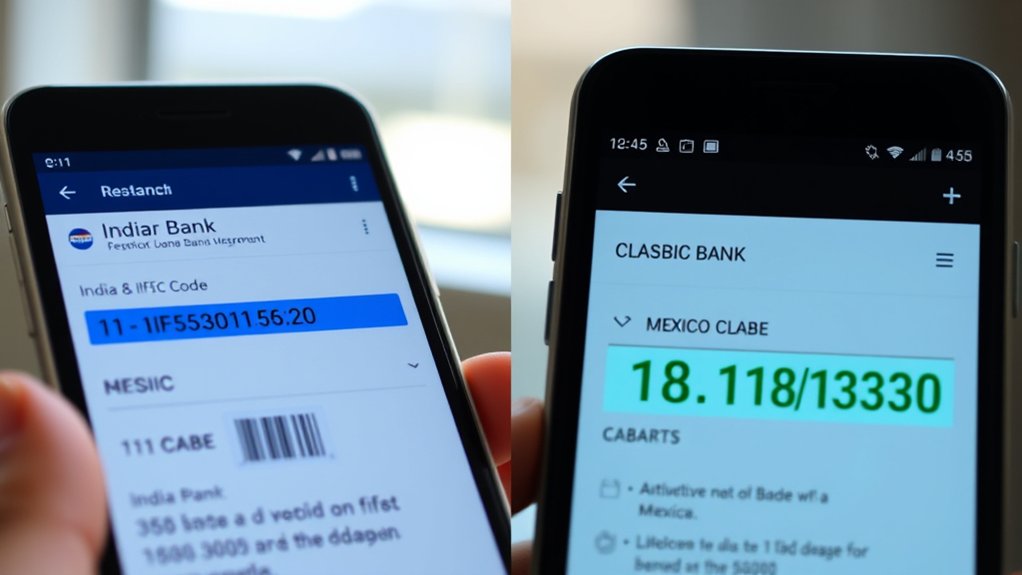No, Ifsc and IFS codes are not the same. They have distinct purposes—Ifsc for banking transactions and IFS for product identification. Understanding the difference is essential for using them correctly.
Understanding IFSC Codes
Understanding IFSC Codes is essential for conducting secure and efficient online financial transactions. In banking transactions, security measures are paramount, especially in international money transfers. IFSC Codes serve as unique identifiers for each bank branch, ensuring that funds reach the correct destination swiftly and securely. When initiating an international transfer, providing the accurate IFSC Code is vital to prevent any delays or misdirected payments. These codes not only streamline the process but also add an extra layer of security by verifying the authenticity of the receiving bank branch. Being diligent in verifying and accurately inputting IFSC Codes is fundamental for smooth and safe financial transactions, both domestically and internationally.
Decoding IFS Codes
To decode IFS codes accurately, follow the specific patterns and structures assigned to each bank branch. Understanding the decoding of IFS codes eliminates common misconceptions and allows for practical applications in banking operations. Each IFS code consists of 11 characters, with the first 4 representing the bank code, the next 1 character reserved as '0' for future use, and the remaining 6 characters denoting the branch code. By grasping this structure, you can easily distinguish between different bank branches and streamline transactions efficiently. It's important to pay attention to these nuances to guarantee seamless fund transfers and other financial activities. Mastering the decoding of IFS codes empowers you to navigate the banking system with confidence and accuracy.
Key Differences Between IFSC and IFS
Let's start by highlighting a key difference between IFSC and IFS codes. IFSC codes are primarily used in the banking sector, facilitating electronic fund transfers, while IFS codes are more commonly utilized in the industrial domain for product identification and tracking. Understanding this distinction is important for effectively understanding the specific functions and applications of these unique code systems.
IFSC for Banking
You can easily distinguish between IFSC and IFS codes by understanding their specific functions in banking transactions. The IFSC (Indian Financial System Code) is a unique 11-character code used in India for domestic fund transfers. It plays a vital role in ensuring the security of banking transactions by accurately directing payments to the right recipient's account. On the other hand, the IFS (International Financial System) code is utilized for international fund transfers, facilitating verification processes to confirm the recipient's bank details. While both codes are essential for seamless financial transactions, the IFSC primarily focuses on domestic transfers within India, enhancing security measures, whereas the IFS is crucial for verifying and processing international fund transfers efficiently.
IFS for Industries
Understanding the key differences between IFSC and IFS codes is essential for industries seeking efficient financial transactions and international fund transfers. While IFSC (Indian Financial System Code) is primarily used in banking for domestic transactions, IFS (International Financial System) codes are important for industries involved in global trade. IFS codes play a significant role in logistics, ensuring seamless movement of goods across borders by providing standardized identification for shipping companies and warehouses. For manufacturing industries, IFS codes are necessary for international payments, enabling smooth transactions with overseas suppliers and distributors. By distinguishing between IFSC and IFS codes, industries can streamline their financial operations, optimize supply chains, and enhance their global competitiveness.
How IFSC Codes Are Used
IFSC codes are used by banks to uniquely identify branches for electronic funds transfer purposes. When you engage in online transactions, the IFSC code plays an essential role in ensuring secure money transfers. It acts as a safety measure, verifying that the funds are being sent to the correct branch before the transaction is completed. Additionally, for international transfers, the IFSC code is indispensable for verification purposes. This code helps confirm the legitimacy of the receiving bank branch and aids in the smooth processing of cross-border transactions. Understanding how IFSC codes are used is critical for ensuring the security and accuracy of your financial transactions, both locally and internationally.
Importance of IFS Codes
To grasp the significance of IFS codes, you must understand their pivotal role in facilitating seamless electronic fund transfers. The benefits of IFSC codes lie in their ability to uniquely identify specific bank branches, ensuring accurate routing of funds. This precision helps prevent delays and errors in transactions, ultimately saving you time and hassle. Additionally, the vital security measures for IFSC codes are essential in safeguarding your financial information. By using encrypted codes and stringent validation processes, IFSC codes help protect against unauthorized transactions and fraud. Embracing the importance of IFS codes not only streamlines your banking experience but also enhances the security of your electronic transactions, providing you with peace of mind.
FAQS About IFSC Vs IFS Codes
Have you ever wondered about the key differences between IFSC and IFS codes? When it comes to a comparison, IFSC (Indian Financial System Code) is used in India for electronic funds transfer, while IFS (International Financial System Code) is utilized globally. The similarities lie in their fundamental purpose of facilitating financial transactions. However, the disparities are significant in terms of application. IFSC codes are specific to each bank branch and are required for domestic transactions within India. On the other hand, IFS codes are used for international transactions and are standardized for banks across different countries. Understanding these distinctions is important for ensuring accurate and efficient processing of financial transactions, whether within India or globally.


















